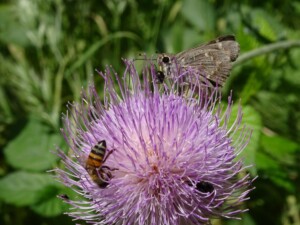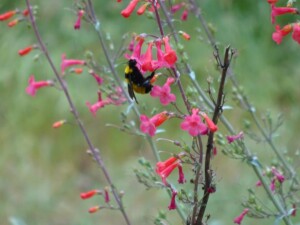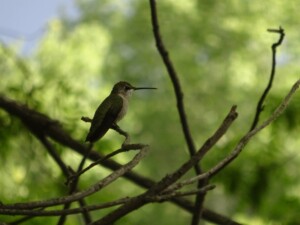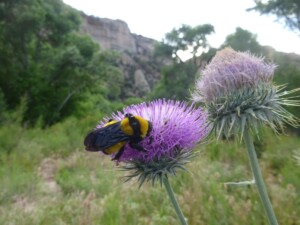by Marci Caballero-Reynolds, Doris Duke Conservation Intern
 National Pollinator Week has arrived, and it’s time to celebrate and learn about our pollinators here in the Southwest. The Sky Island Region contains important migratory corridors for bees, flies, bats, butterflies, moths, ants, birds, and bats that have formed mutualistic relationships to blooming plants. With a rapidly changing climate that has resulted in increased temperatures and earlier springs, some species of native plants are blooming earlier and growing in areas not typically found. This puts pollinator species and local ecosystems at risk.
National Pollinator Week has arrived, and it’s time to celebrate and learn about our pollinators here in the Southwest. The Sky Island Region contains important migratory corridors for bees, flies, bats, butterflies, moths, ants, birds, and bats that have formed mutualistic relationships to blooming plants. With a rapidly changing climate that has resulted in increased temperatures and earlier springs, some species of native plants are blooming earlier and growing in areas not typically found. This puts pollinator species and local ecosystems at risk.
 Pollinators largely affect other species in communities making them a “keystone species.” By conserving pollinators, we also protect myriad other species that depend upon them. Many migratory corridors are fragmented, which creates barriers to pollinator movement as their nectar sources are not contiguous. In addition, many non-native species displace native plants that provide resources for pollinators. Worldwide, pollinators have declined with many species being “listed species.” We need to protect our pollinators because many of the foods, beverages, fibers, spices, and medicines we rely on need to be pollinated by animals. Without pollinators we would not survive.
Pollinators largely affect other species in communities making them a “keystone species.” By conserving pollinators, we also protect myriad other species that depend upon them. Many migratory corridors are fragmented, which creates barriers to pollinator movement as their nectar sources are not contiguous. In addition, many non-native species displace native plants that provide resources for pollinators. Worldwide, pollinators have declined with many species being “listed species.” We need to protect our pollinators because many of the foods, beverages, fibers, spices, and medicines we rely on need to be pollinated by animals. Without pollinators we would not survive.
 As an intern for the summer, I am fortunate to get into the action by working on the Supporting Pollinator Adaptation Needs in the Sky Islands project. We are working in three target canyons over the summer: Bear Canyon in the Santa Catalina Mountains, Parker Canyon in the Huachuca Mountains, and Aravaipa Canyon in the Galiuro Mountains. Each canyon houses a diverse set of plant species that we will identify and collect seed from. The seeds will be grown out and planted in designated appropriate habitat. This week I will be headed to Aravaipa Canyon to remove invasive species and get to explore one of Arizona’s natural sanctuaries and migratory corridors. This work is made possible by a grant from the Wildlife Conservation Society through the Climate Adaptation Fund, which was established by a grant from the Doris Duke Charitable Foundation—the same foundation that sponsors my internship!
As an intern for the summer, I am fortunate to get into the action by working on the Supporting Pollinator Adaptation Needs in the Sky Islands project. We are working in three target canyons over the summer: Bear Canyon in the Santa Catalina Mountains, Parker Canyon in the Huachuca Mountains, and Aravaipa Canyon in the Galiuro Mountains. Each canyon houses a diverse set of plant species that we will identify and collect seed from. The seeds will be grown out and planted in designated appropriate habitat. This week I will be headed to Aravaipa Canyon to remove invasive species and get to explore one of Arizona’s natural sanctuaries and migratory corridors. This work is made possible by a grant from the Wildlife Conservation Society through the Climate Adaptation Fund, which was established by a grant from the Doris Duke Charitable Foundation—the same foundation that sponsors my internship!
There are multiple things you can do all year long to help our region’s pollinators. Grow native flowering plants in a variety of colors and sizes to attract pollinators. Leave out water for pollinators to hydrate and keep plants watered. Limit use of pesticides and insecticides.
Here is a list of websites you can visit to learn more about pollinators: 
- https://www.xerces.org
- https://swmonarchs.org
- http://www.hummonnet.org
- https://www.usanpn.org
- http://www.pollinator.org
- http://www.batcon.org
